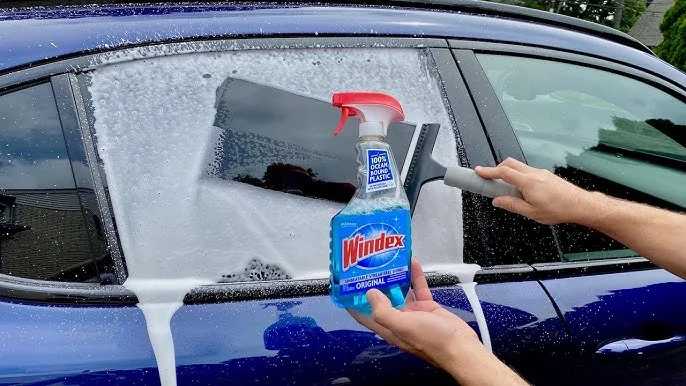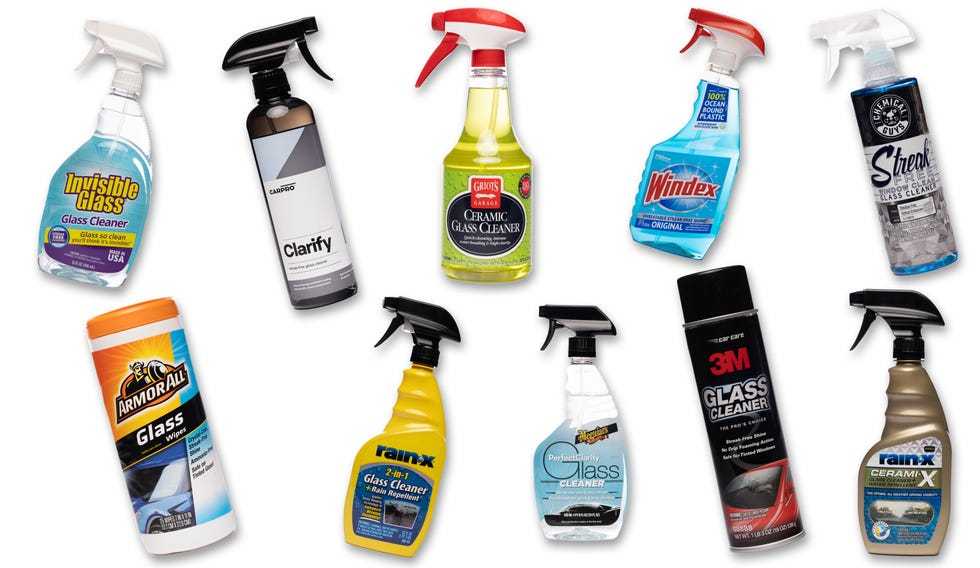Avoid using harsh household cleaners like ammonia-based products, vinegar, or paper towels to clean your car windows. These substances can cause streaks, damage the glass, or leave residues that impair visibility. Opt for specialized automotive glass cleaners and soft microfiber cloths instead for a clear, streak-free shine.
When it comes to maintaining perfect visibility on the road, knowing what *not* to use is just as important as knowing what to use. Many car owners unknowingly damage their windows by using improper cleaning products or tools. Household cleaners like ammonia or vinegar are too strong and can create streaks or harm the glass coating over time. Similarly, abrasive materials such as paper towels or harsh scrubbers can scratch the surface, making the windows more difficult to see through. Using the wrong products not only affects the appearance but also compromises safety. In this article, we’ll explore which cleaning agents and tools you should avoid to keep your car windows spotless and in top condition, ensuring clear sightlines every drive.
What not to use to clean car windows?
Keeping your car windows spotless is important for safety and visibility. But, using the wrong cleaning products can cause damage or leave streaks. Let’s explore what cleaning methods and products you should avoid. Knowing what not to use can save you time and money, and help keep your windows crystal clear.
Avoid Household Glass Cleaners with Harsh Chemicals
Many household glass cleaners contain chemicals that are too strong for automotive glass. Products with ammonia or bleach may seem effective but can harm the glass coating over time. They are also more likely to leave streaks or residue that impairs visibility. Using the wrong cleaner may also damage adjacent rubber seals or plastics around the window.
Why ammonia-based cleaners are problematic
Ammonia is a common ingredient in many household cleaners. While it cleans well on indoor glass, it can create a hazy film on car windows. This film reduces transparency and can make it harder to see clearly in bright sunlight or at night. Over time, ammonia can also degrade rubber around the window seals, causing leaks or rattles.
Impact of bleach and other harsh chemicals
Bleach and similar strong chemicals should never be used on car windows. These substances can cause irreversible damage to the glass surface. They may also strip away protective coatings, leading to increased glare or even corrosion on metal parts of the window frame.
Steer Clear of Abrasive Cleaning Materials
Using abrasive materials might seem like a good idea to remove stubborn dirt, but they can scratch or haze the glass. Even rough towels or scrub pads can leave fine scratches that impair your view. These scratches can trap dirt and grime, making cleaning less effective over time.
Types of abrasive materials to avoid
- Steel wool pads
- Rough scrub brushes
- Heavy-duty scouring pads
- Coarse sponges
What happens if you use abrasive tools
Scratches on your car windows are not only unsightly but can also cause glare while driving. These tiny scratches can fill with dirt, leading to a cloudy or hazy appearance. Regular use of abrasive materials can significantly shorten the lifespan of your windows.
Do Not Use Laundry Detergents or Dish Soap
While dish soap might seem like a handy solution for cleaning, it is not formulated for automotive glass. Laundry detergents and dish soaps can leave residues or cause streaks. They may also strip protective coatings on the glass or rubber seals, leading to potential damage.
Residue buildup from unsuitable cleaning agents
Many dish soaps contain harsh detergents that can leave an oily film on your windows. This residue attracts dirt and dust, making your windows appear dirty faster. It also complicates the cleaning process, requiring multiple washes to remove lingering film.
Protective coatings and their importance
Some cars have special coatings on their windows for UV protection or water runoff. Using laundry detergents can strip these coatings, reducing their effectiveness. This can lead to increased glare or difficulty in water beading and runoff during rain.
Avoid Using Vinegar or Lemon Juice Directly on Windows
Although natural remedies like vinegar and lemon juice are popular, using them directly on car windows can cause issues. Their acidity might damage window tinting or protective coatings if not diluted properly.
Risks associated with concentrated acids
While diluted vinegar can be safe when used correctly, concentrated forms or undiluted lemon juice can etch into the glass or damage tint. Over time, acidity can degrade the rubber or plastic around your windows, leading to leaks or looseness.
Proper use of natural cleaning solutions
- Always dilute vinegar with water before applying
- Use a soft cloth or sponge to avoid scratching
- Test on a small area to ensure no damage occurs
Stay Away from Petroleum-Based Products
Products like WD-40 or petrol-based cleaners are not made for glass cleaning. They can leave oily residues that are tough to remove and can diminish visibility. These products are better suited for lubricating parts rather than cleaning windows.
Oily residues that impair visibility
Petroleum-based products can leave an invisible film on the glass surface. Over time, this film attracts dirt and dust, making your windows appear cloudy or streaky. Moreover, they can create a slippery surface that compromises safe cleaning and wiping.
Potential damage to rubber and plastics
Petrol and similar products can cause plastics and rubber around the windows to deteriorate. This erosion may lead to loose seals, increasing the risk of leaks or fogging inside your vehicle.
Refrain from Using Bird Droppings or Tree Sap with Improper Tools
While it’s natural to want quick fixes, using harsh scrapers or aggressive cleaning agents on bird droppings or tree sap can scratch the glass. Instead, gentle methods and appropriate products are better for protecting your windows.
Why aggressive rubbing damages glass
Scraping or rubbing aggressively can create fine scratches in the glass surface. These scratches not only look bad but also lead to increased glare and reduced clarity when driving.
Best practices for removing stubborn stains
- Let droppings or sap soften with warm water or specialized cleaners
- Use a soft microfiber cloth to wipe gently
- Avoid using knives or metal scrapers
Additional Tips for Safe and Effective Car Window Cleaning
Always choose the right products designed for automotive use. Use soft microfiber towels for wiping to prevent scratches. Regular cleaning prevents buildup and reduces the need for harsh or damaging agents. Testing new cleaning solutions on a small area first can also help avoid unexpected damage.
By avoiding these harmful cleaning products and techniques, you can keep your car windows clear and in excellent condition. Proper maintenance ensures better visibility, longer-lasting glass, and a safer driving experience.
The Easiest Way To Clean The Inside of Your Windshield (No Streaks!)
Frequently Asked Questions
What cleaning products should I avoid using on my car windows?
Avoid using household products like ammonia-based cleaners, bleach, or any abrasive substances. These can damage the tint, cause streaks, or scratch the glass. Stick to products specifically designed for automotive glass to ensure safe and effective cleaning.
Why is it problematic to use dish soap for cleaning car windows?
Dish soap often contains harsh detergents that can leave residues or streaks on your windows. It may also strip away any protective coatings or tinting, reducing visibility and potentially damaging the glass over time. Use a mild glass cleaner instead for the best results.
Can using abrasive cloths or scrubbers harm my car windows?
Yes, abrasive materials can scratch the glass surface and damage any tint or coating on your windows. Always choose a soft, lint-free cloth or a microfiber towel when cleaning your car windows to prevent scratches and maintain clarity.
Is it okay to use vinegar or other acidic solutions on car windows?
While vinegar can sometimes be used for cleaning, its acidity can weaken window tint films or seals if used excessively. It’s safer to opt for dedicated automotive glass cleaners that are pH-balanced and designed for vehicle use.
Why should I avoid using wood-based or paper towels to clean my car windows?
Wood-based and paper towels tend to leave lint and fibers behind, reducing visibility and causing streaks. They can also scratch the glass if used with too much pressure. Always use a clean, soft microfiber cloth for a streak-free finish.
Final Thoughts
What not to use to clean car windows? Avoid harsh chemicals like ammonia-based cleaners, as they can damage window coatings and cause streaks. Stay away from abrasive scrubbers that scratch the glass surface. Using paper towels or old rags may leave lint and residues.
Stick to gentle, glass-specific cleaners and soft microfiber cloths for a clear, streak-free finish. Protect your windows by choosing safe cleaning methods. Focusing on proper cleaning techniques helps maintain your car’s visibility and appearance.



